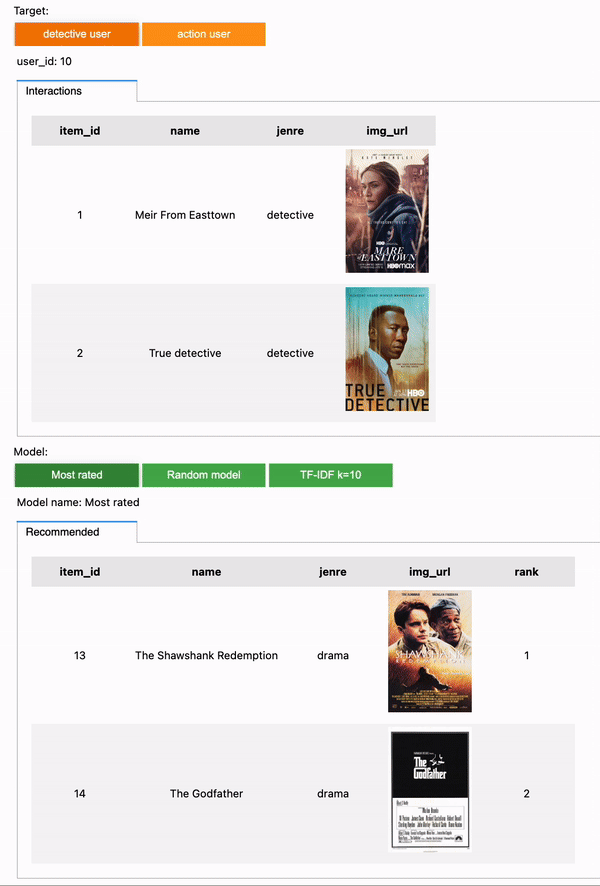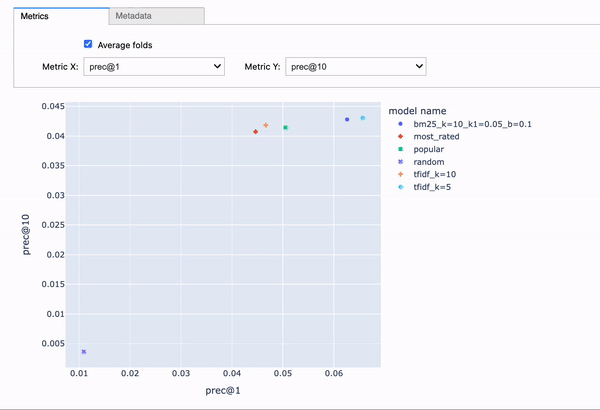Documentation | Examples | Tutorials | Contributing | Releases | Developers Board
RecTools is an easy-to-use Python library which makes the process of building recommender systems easier and faster than ever before.
BERT4Rec and SASRec are now available in RecTools:
- Fully compatible with our
fit/recommendparadigm and require NO special data processing - Explicitly described in our Transformers Theory & Practice Tutorial: loss options, item embedding options, category features utilization and more!
- Configurable, customizable, callback-friendly, checkpoints-included, logs-out-of-the-box, custom-validation-ready, multi-gpu-compatible! See Transformers Advanced Training User Guide and Transformers Customization Guide
- Public benchmarks which compare RecTools models to other open-source implementations following BERT4Rec replicability paper show that RecTools implementations achieve highest scores on multiple datasets: Performance on public transformers benchmarks
Prepare data with
wget https://files.grouplens.org/datasets/movielens/ml-1m.zip
unzip ml-1m.zipimport pandas as pd
from implicit.nearest_neighbours import TFIDFRecommender
from rectools import Columns
from rectools.dataset import Dataset
from rectools.models import ImplicitItemKNNWrapperModel
# Read the data
ratings = pd.read_csv(
"ml-1m/ratings.dat",
sep="::",
engine="python", # Because of 2-chars separators
header=None,
names=[Columns.User, Columns.Item, Columns.Weight, Columns.Datetime],
)
# Create dataset
dataset = Dataset.construct(ratings)
# Fit model
model = ImplicitItemKNNWrapperModel(TFIDFRecommender(K=10))
model.fit(dataset)
# Make recommendations
recos = model.recommend(
users=ratings[Columns.User].unique(),
dataset=dataset,
k=10,
filter_viewed=True,
)RecTools is on PyPI, so you can use pip to install it.
pip install rectools
The default version doesn't contain all the dependencies, because some of them are needed only for specific functionality. Available user extensions are the following:
lightfm: adds wrapper for LightFM model,torch: adds models based on neural nets,visuals: adds visualization tools,nmslib: adds fast ANN recommenders.
Install extension:
pip install rectools[extension-name]
Install all extensions:
pip install rectools[all]
The table below lists recommender models that are available in RecTools.
See recommender baselines extended tutorial for deep dive into theory & practice of our supported models.
| Model | Type | Description (🎏 for user/item features, 🔆 for warm inference, ❄️ for cold inference support) | Tutorials & Benchmarks |
|---|---|---|---|
| SASRec | Neural Network | rectools.models.SASRecModel - Transformer-based sequential model with unidirectional attention mechanism and "Shifted Sequence" training objective 🎏 |
📕 Transformers Theory & Practice 📗 Advanced training guide 📘 Customization guide 🚀 Top performance on public benchmarks |
| BERT4Rec | Neural Network | rectools.models.BERT4RecModel - Transformer-based sequential model with bidirectional attention mechanism and "MLM" (masked item) training objective 🎏 |
📕 Transformers Theory & Practice 📗 Advanced training guide 📘 Customization guide 🚀 Top performance on public benchmarks |
| implicit ALS Wrapper | Matrix Factorization | rectools.models.ImplicitALSWrapperModel - Alternating Least Squares Matrix Factorizattion algorithm for implicit feedback. 🎏 |
📙 Theory & Practice 🚀 50% boost to metrics with user & item features |
| implicit BPR-MF Wrapper | Matrix Factorization | rectools.models.ImplicitBPRWrapperModel - Bayesian Personalized Ranking Matrix Factorization algorithm. |
📙 Theory & Practice |
| implicit ItemKNN Wrapper | Nearest Neighbours | rectools.models.ImplicitItemKNNWrapperModel - Algorithm that calculates item-item similarity matrix using distances between item vectors in user-item interactions matrix |
📙 Theory & Practice |
| LightFM Wrapper | Matrix Factorization | rectools.models.LightFMWrapperModel - Hybrid matrix factorization algorithm which utilises user and item features and supports a variety of losses.🎏 🔆 ❄️ |
📙 Theory & Practice 🚀 10-25 times faster inference with RecTools |
| EASE | Linear Autoencoder | rectools.models.EASEModel - Embarassingly Shallow Autoencoders implementation that explicitly calculates dense item-item similarity matrix |
📙 Theory & Practice |
| PureSVD | Matrix Factorization | rectools.models.PureSVDModel - Truncated Singular Value Decomposition of user-item interactions matrix |
📙 Theory & Practice |
| DSSM | Neural Network | rectools.models.DSSMModel - Two-tower Neural model that learns user and item embeddings utilising their explicit features and learning on triplet loss.🎏 🔆 |
- |
| Popular | Heuristic | rectools.models.PopularModel - Classic baseline which computes popularity of items and also accepts params like time window and type of popularity computation.❄️ |
- |
| Popular in Category | Heuristic | rectools.models.PopularInCategoryModel - Model that computes poularity within category and applies mixing strategy to increase Diversity.❄️ |
- |
| Random | Heuristic | rectools.models.RandomModel - Simple random algorithm useful to benchmark Novelty, Coverage, etc.❄️ |
- |
- All of the models follow the same interface. No exceptions
- No need for manual creation of sparse matrixes, torch dataloaders or mapping ids. Preparing data for models is as simple as
dataset = Dataset.construct(interactions_df) - Fitting any model is as simple as
model.fit(dataset) - For getting recommendations
filter_viewedanditems_to_recommendoptions are available - For item-to-item recommendations use
recommend_to_itemsmethod - For feeding user/item features to model just specify dataframes when constructing
Dataset. Check our example - For warm / cold inference just provide all required ids in
usersortarget_itemsparameters ofrecommendorrecommend_to_itemsmethods and make sure you have features in the dataset for warm users/items. Nothing else is needed, everything works out of the box. - Our models can be initialized from configs and have useful methods like
get_config,get_params,save,load. Common functionsmodel_from_config,model_from_paramsandload_modelare available. Check our example
calc_metrics for classification, ranking, "beyond-accuracy", DQ, popularity bias and between-model metrics
Example | Demo | Documentation
To install all requirements
- you must have
python3andpoetryinstalled - make sure you have no active virtual environments (deactivate conda
baseif applicable) - run
make install
For autoformatting run
make format
For linters check run
make lint
For tests run
make test
For coverage run
make coverage
To remove virtual environment run
make clean
- Emiliy Feldman [Maintainer]
- Daria Tikhonovich [Maintainer]
- Andrey Semenov
- Mike Sokolov
- Maya Spirina
- Grigoriy Gusarov
- Aki Ariga
- Nikolay Undalov
Previous contributors: Ildar Safilo [ex-Maintainer], Daniil Potapov [ex-Maintainer], Alexander Butenko, Igor Belkov, Artem Senin, Mikhail Khasykov, Julia Karamnova, Maxim Lukin, Yuri Ulianov, Egor Kratkov, Azat Sibagatulin, Vadim Vetrov










